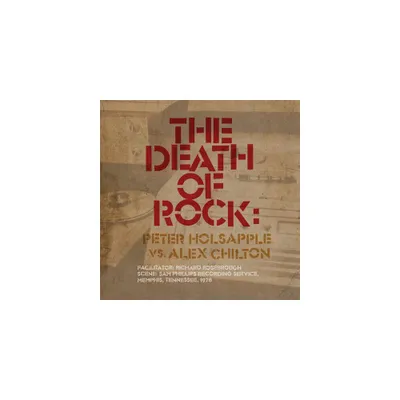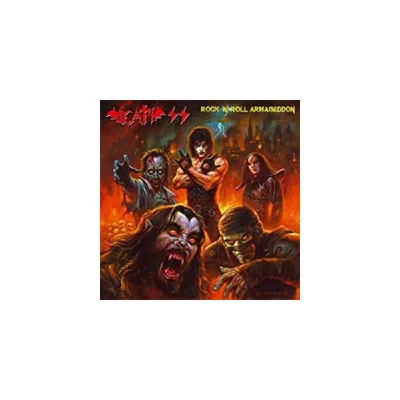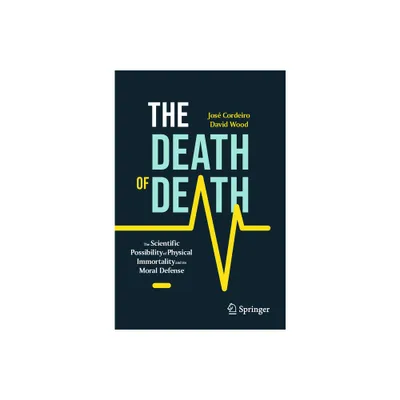Home
The Death of Rock
Loading Inventory...
Barnes and Noble
The Death of Rock
Current price: $17.99


Barnes and Noble
The Death of Rock
Current price: $17.99
Loading Inventory...
Size: CD
*Product Information may vary - to confirm product availability, pricing, and additional information please contact Barnes and Noble
Sometimes working with one of your heroes isn't all it's cracked up to be. In 1978,
Peter Holsapple
was a power pop fan obsessed with
Big Star
who had been in a band called
the H-Bombs
, who cut a single produced by
Alex Chilton
.
Holsapple
relocated to Memphis, Tennessee in hopes of ingratiating himself into the local music scene, and he began recording stuff at the Sam Phillips Recording Service. Through musician and engineer
Richard Rosebrough
, who was helping
Chilton
make his gloriously shambolic album
Like Flies on Sherbert
at the time,
was re-introduced to
. Over beers one night,
informed his acolyte, "I heard some of that stuff you're working on with
Richard
...and it really sucks." Despite his lack of enthusiasm,
agreed to drop by the studio and observe, and the evening he showed up, he ended up jamming with
and his rhythm section as the tape rolled. Forty years after the fact, the recordings from that night have been unearthed and released under the title
The Death of Rock
, after one of
's songs. In his liner notes,
writes that "I caught
Alex
exiting a world of sweet pop that I was only just trying to enter, and the door hit me on the way in."
's take on these tapes is dead-on; while his compositions find him working out the rudiments of the smart pop style he would refine in
the dB's
(especially on "Bad Reputation" and "House Is Not a Home"), the numbers with
at the helm are gritty and purposefully chaotic.
runs wild on passionate but ramshackle covers of "Train Kept A Rollin'" and "Hey Mona" as well as an unrehearsed run through his harrowing portrait of Memphis life, "Marshall Law." With
up front, this combo sounds fairly solid as they help channel his
influences. With
in charge, it's exciting and sometimes funny (especially as they slog through "Tennis Bum"), but it threatens to fly off the rails at any moment.
is truly fascinating as a historical record of a meeting of two minds who unexpectedly fail to follow parallel paths. ~ Mark Deming
Peter Holsapple
was a power pop fan obsessed with
Big Star
who had been in a band called
the H-Bombs
, who cut a single produced by
Alex Chilton
.
Holsapple
relocated to Memphis, Tennessee in hopes of ingratiating himself into the local music scene, and he began recording stuff at the Sam Phillips Recording Service. Through musician and engineer
Richard Rosebrough
, who was helping
Chilton
make his gloriously shambolic album
Like Flies on Sherbert
at the time,
was re-introduced to
. Over beers one night,
informed his acolyte, "I heard some of that stuff you're working on with
Richard
...and it really sucks." Despite his lack of enthusiasm,
agreed to drop by the studio and observe, and the evening he showed up, he ended up jamming with
and his rhythm section as the tape rolled. Forty years after the fact, the recordings from that night have been unearthed and released under the title
The Death of Rock
, after one of
's songs. In his liner notes,
writes that "I caught
Alex
exiting a world of sweet pop that I was only just trying to enter, and the door hit me on the way in."
's take on these tapes is dead-on; while his compositions find him working out the rudiments of the smart pop style he would refine in
the dB's
(especially on "Bad Reputation" and "House Is Not a Home"), the numbers with
at the helm are gritty and purposefully chaotic.
runs wild on passionate but ramshackle covers of "Train Kept A Rollin'" and "Hey Mona" as well as an unrehearsed run through his harrowing portrait of Memphis life, "Marshall Law." With
up front, this combo sounds fairly solid as they help channel his
influences. With
in charge, it's exciting and sometimes funny (especially as they slog through "Tennis Bum"), but it threatens to fly off the rails at any moment.
is truly fascinating as a historical record of a meeting of two minds who unexpectedly fail to follow parallel paths. ~ Mark Deming


















